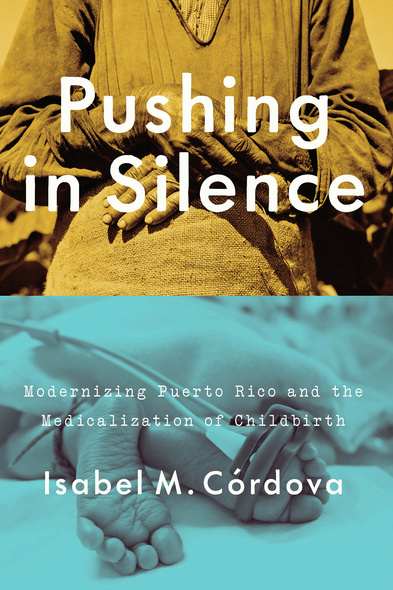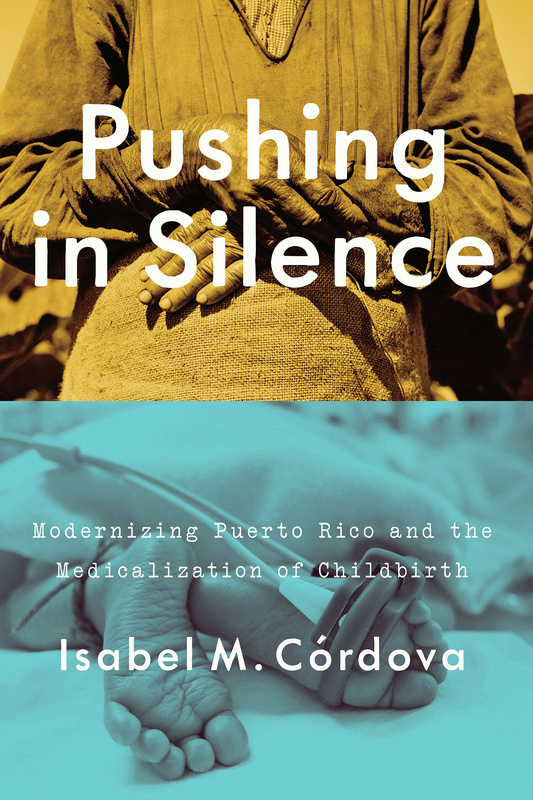
Pushing in Silence
Modernizing Puerto Rico and the Medicalization of Childbirth
As Puerto Rico rapidly industrialized from the late 1940s until the 1970s, the social, political, and economic landscape changed profoundly. In the realm of heath care, the development of medical education, new medical technologies, and a new faith in science radically redefined childbirth and its practice. What had traditionally been a home-based, family-oriented process, assisted by women and midwives and “accomplished” by mothers, became a medicalized, hospital-based procedure, “accomplished” and directed by biomedical, predominantly male, practitioners, and, ultimately reconfigured, after the 1980s, into a technocratic model of childbirth, driven by doctors’ fears of malpractice suits and hospitals’ corporate concerns.
Pushing in Silence charts the medicalization of childbirth in Puerto Rico and demonstrates how biomedicine is culturally constructed within regional and historical contexts. Prior to 1950, registered midwives on the island outnumbered registered doctors by two to one, and they attended well over half of all deliveries. Isabel M. Córdova traces how, over the next quarter-century, midwifery almost completely disappeared as state programs led by scientifically trained experts and organized by bureaucratic institutions restructured and formalized birthing practices. Only after cesarean rates skyrocketed in the 1980s and 1990s did midwifery make a modest return through the practices of five newly trained midwives. This history, which mirrors similar patterns in the United States and elsewhere, adds an important new chapter to the development of medicine and technology in Latin America.
A thoughtful analysis of birthing practices in Puerto Rico, written from a historical, multifaceted perspective.
It’s more important than ever to restore a sense of [Puerto Rico] as a complex place with a rich history—as much more than a disaster. This book certainly gives us that.
Pushing in Silence eloquently narrates the complex experience of birth in Puerto Rico over the course of the second-half of the twentieth century to illustrate how medicalized birth arose due to a cultural value change rather than a vis-á-vis state imposition.
Whereas traditional historical accounts have focused on the purely economic and political forces at lay in the institutional development of biomedicine in Puerto Rico, Córdova astutely illustrates the inherent intersectionality in these dynamics. She works to explore the entangled relationship of class, gender, race, politics and power that imbue childbirth and medicine more broadly.
Córdoba’s writing is clear, her story is compelling, and she makes excellent use of historical documents and the interviews that she conducted with midwives, mothers, and doctors...This book is important reading for those interested in medical history, recent Puerto Rican history, and gender studies, as well as for medical professionals.
Engaging…[Córdova] carefully links the medicalization of pregnancy, labor, and delivery on the island to changing economic and industrial policies; to a growing bureaucratic emphasis on standardization and efficiency; and to the professionalization of medical doctors, particularly obstetricians, between 1948 and the early 2000s.
Meticulously researched and engagingly written…[Córdova] provides novel insights on the forces that have so dramatically reshaped the experience of childbirth in Puerto Rico...Pushing in Silence is an excellent contribution not only to the history of Puerto Rico but to the history of gender, medicine, and modernization more broadly.
The ethnographic element of Córdova's research methods gives her writing greater sensitivity to the stratified nature of reproduction and, specifically, highlights that the ways women give birth vary based on class, gender and geographic space. As a result, Pushing in Silence reveals overall trends and local nuances.
A very detailed and enlightening read…Pushing in Silence contributes to the understanding of the history of medicine and of birthing in the Americas. It provides a poignant look at the effects of development policies on the lived experiences of birth and will surely encourage further research.
Excellent...Pushing in Silence is a thorough, carefully documented, multilayered history.
The case of childbirth in Puerto Rico [presented in Pushing in Silence] tells a compelling story about the relatively short life span of pure capitalism implemented in the most intentional and soulless manner, and suggests its potential to dispatch with ancestral cultural practices in very short order.
Córdova’s fascinating history of the (over)medicalization of child birth in twentieth-century Puerto Rico demonstrates how ideological changes are embedded in sociocultural, political, and economic shifts...This is an important examination of how individual decisions, here related to child birth, become imbricated in more diffuse forms of biopower. By relying on anthropological theories of child birth and the body that center women’s embodied experiences, Córdova tells a story about women from women’s perspectives with attention to the constraints within which they occurred. It is a model for how to write biomedical history.
A brilliantly written, accessible, and comprehensive analysis of the multifaceted social, cultural, and historical conditions that led to the medicalization of birthing in Puerto Rico, which enabled doctors to replace midwives. This history has not been written before. The research is original and unique and is a contribution to the fields of sociology, anthropology, history, and biomedicine.
Acknowledgments
Introduction
Chapter 1. Phase One: Midwife-Assisted Home Births, 1948–1953
Chapter 2. Phase Two: Transitioning toward Hospital Births, 1954–1958
Chapter 3. Phase Three: Physician-Assisted Hospital Births, 1959–1965
Chapter 4. Phase Four: Medicalized Births, 1966–1979
Chapter 5. Phase Five: Novoparteras and a Technocratic, Litigation-Based Model of Birth, 1980–2000
Conclusion and Epilogue
Notes
Bibliography
Index




